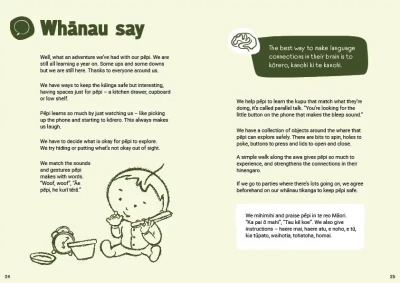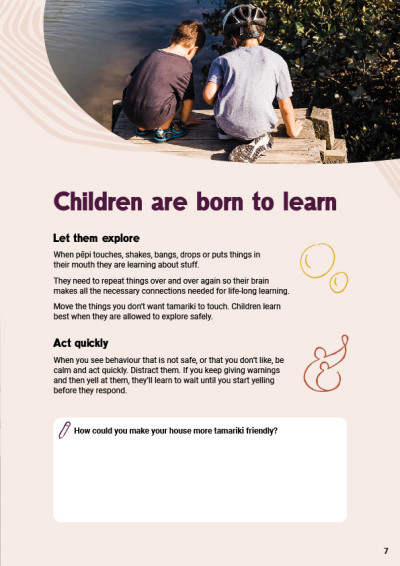
Making our home a safe place for baby
As babies develop new movement skills, whānau need to look out for new dangers to pēpi and agree on ways to keep them safe.
Differing views on raising pēpi
As babies develop new movement skills – rolling, shuffling, crawling, kneeling, standing – they’ll be interested in more and more places and objects around the home.
Whānau will need to think about how to positively guide and teach pēpi to keep them safe in the different places around their home, such as rooms for cooking, laundry, washing and using the toilet.
Looking for dangers around the home
Look at safety around the house with whānau. What sort of things might be a danger to a baby who spends most of their time on the floor? What about the risks of falling when they’re up on furniture or beds or can get to stairs or steps?
There’s a lot to think about:
- bathroom
- car safety
- cords, electrical items, heaters
- hot liquids
- medicines
- plastic bags
- poisons
- sharp objects
- small objects
- stairs and steps
- water.
More guidance can be found on the Whānau Awhina Plunket website.
Safety around the home | Whānau Awhina Plunket(external link)
Accidental actions that can create risks
Talk about the dangers other people and places in their lives might create by accident?
Examples include:
- Older siblings might leave doors and gates open or small toys around that pose a choking risk to baby.
- Visitors might have little understanding of what’s appropriate for a baby to be exposed to.
- Parents or other adults, in moments of distraction, might leave a hot drink or a glass within baby’s reach.
- Places that are not designed for children, such as cafes, sports clubs, and shops, might present dangers whānau haven’t thought about at home.
Seeing things from baby’s point of view
Sometimes whānau might have conflicting views on child safety and discipline. This can be confusing and unsettling for new parents, especially if they’re living together with extended family. It can be more difficult when the parents themselves have differing views.
Helping whānau understand the link between child development and behaviour, and see things from the baby’s point of view might help them put their baby’s wellbeing first, rather than feel they have to listen to everyone else.
Converastion ideas
Helpful resources for whānau
-

Safekids Aotearoa
Safekids Aotearoa provides practical advice based on international research, local knowledge and mātauranga, to help keep children safe from serious injuries like falls, drowning and incidents on the road.
-
Button battery safety<
Button battery safetyButton batteries can be extremely harmful to our children. Check out this video from Safekids Aotearoa to avoid the dangers of button batteries and what to do if your child swallows one.












